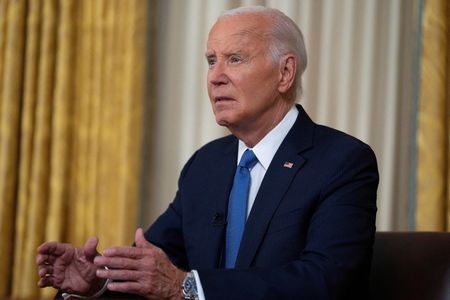By Doina Chiacu and Ted Hesson
WASHINGTON (Reuters) -The White House will offer deportation relief and work permits to an estimated 11,500 Lebanese nationals already in the U.S., due to conflict between Israel and Hezbollah in southern Lebanon, U.S. President Joe Biden said in a memo on Friday.
The measure, under an authority known as Deferred Enforced Departure, will allow Lebanese nationals to remain in the U.S. for 18 months and could be renewed.
The announcement comes after Vice President Kamala Harris pressured Israeli Prime Minister Benjamin Netanyahu on Thursday to help reach a Gaza ceasefire deal that would ease the suffering of Palestinian civilians, striking a tougher tone than Biden. Harris has emerged as the likely Democratic presidential nominee after Biden ended his campaign on Sunday.
Israel and Hezbollah have been trading fire since Hezbollah announced a “support front” with Palestinians shortly after its ally Hamas attacked southern Israeli border communities on Oct. 7, triggering Israel’s military assault in Gaza.
Hezbollah is an Iran-backed militant group and the most powerful military and political force in Lebanon.
U.S. Representative Debbie Dingell, a Democrat from Michigan, which is home to Lebanese Americans in Detroit and elsewhere, applauded the move and estimated it would cover 11,500 people.
“Michigan is home to many Lebanese Americans who continue to watch their families suffer as Lebanon faces an unprecedented economic, political, and financial disaster,” she said in a statement.
Former President Donald Trump, a Republican seeking another term in the White House, has pledged mass deportations if reelected. His campaign did not immediately respond to a request for comment.
The fighting in Lebanon has killed more than 100 civilians and more than 300 Hezbollah fighters, according to a Reuters tally.
On the Israeli side, 10 Israeli civilians, a foreign agricultural worker and 20 Israeli soldiers have been killed.
Tens of thousands have been evacuated from both sides of the border.
(Reporting by Doina Chiacu and Ted Hesson in Washington; Editing by Rami Ayyub)











